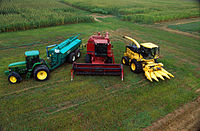Agricultural subsidy

Imagine you have a lemonade stand and all your friends also have their own lemonade stands. Sometimes, it is hard to sell all your lemonade because there are too many people selling the same thing. But suppose the government comes along and gives you and your friends some money to help you sell your lemonade. This money is called a subsidy.
Now, you have more money to make your lemonade taste better, or you can sell it at a lower price than your friends. Since your lemonade tastes great and your price is lower, more people will come buy your lemonade, and your business will grow bigger.
This is what happens with farmers. Sometimes they grow too much of the same crop, and there is too much food for everyone to buy. So the government gives them some extra money to grow their crops or raise their animals.
This extra money helps farmers to buy better seeds, fertilizers, or equipment, and they can sell their products for a lower price or make them taste better. This means that more people will buy their food, and the farmers can make more money.
Subsidies can be helpful for farmers, but they can also make it hard for other people who don't get the money to compete. Like if your neighbor has a lemonade stand but doesn't get a subsidy, it's harder for them to sell their lemonade because you have more money to make yours better.
That's why some people think subsidies are not fair or don't help everyone. But subsidies are also important to help farmers keep growing food for everyone to have enough to eat.
Now, you have more money to make your lemonade taste better, or you can sell it at a lower price than your friends. Since your lemonade tastes great and your price is lower, more people will come buy your lemonade, and your business will grow bigger.
This is what happens with farmers. Sometimes they grow too much of the same crop, and there is too much food for everyone to buy. So the government gives them some extra money to grow their crops or raise their animals.
This extra money helps farmers to buy better seeds, fertilizers, or equipment, and they can sell their products for a lower price or make them taste better. This means that more people will buy their food, and the farmers can make more money.
Subsidies can be helpful for farmers, but they can also make it hard for other people who don't get the money to compete. Like if your neighbor has a lemonade stand but doesn't get a subsidy, it's harder for them to sell their lemonade because you have more money to make yours better.
That's why some people think subsidies are not fair or don't help everyone. But subsidies are also important to help farmers keep growing food for everyone to have enough to eat.
Related topics others have asked about:
